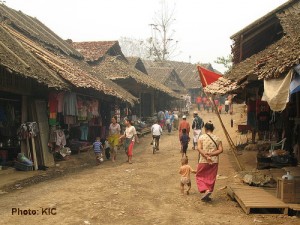Women from the largest refugee camp in Thailand’s express their concerns and dreams as the world marks international women’s day.
Naw Kaw, 44, a mother of three and a Karen refugee, sits down, shielding her face from the midday sun. She has been in Mae La refugee camp for two decades. She fled Burma after being used by the Burma Army as forced labor. Speaking to Karen News she said that she does not want to go back to Karen State.
“My dream is that our whole family goes to America to live. My oldest son who is 18 wants to go right now, but our application process for resettlement has already taken two years. He is getting more and more depressed that it is taking so long.”
Life in the camps can be tough, seven years ago an untreated eye infection left Naw Kaw blind in her right eye, but Naw Kaw said she felt safer as a mother raising her three children in the refugee camp than back in Burma.
“It can be hard – my husband works as a daily laborer to help us get by. Everyday he goes to find work, sometimes there is no work. He might earn one thousand baht per month, but it is better than Burma, there is no military here.”
Mae La refugee camp, one of three camps in Thailand’s Tak province and the largest in Thailand, is home to around 44,000 refugees, according to official statistics from The Border Consortium (TBC) that helps manage the camps.
Moo Say, 20, has just graduated from Post-10. A household leader in the camps, she is in charge of perhaps 100 houses, a considerable responsibility for someone so young.
“Young people in the camps are hard workers, but I am concerned that they don´t know how to survive into the future if we go back to Burma, they do not know how to farm, or have a livelihood or a full-time job.”
Switching from Karen to English, Moo Say said her dream was to become a highly qualified professional translator of Karen language and that she wanted to move to Australia.
“I do not want to go to Burma, and neither do my friends. Some of them want to go see Karen villages in Burma, but for them it is a curiosity, like as tourists, they, like me, were born in the camp and have never been to Karen State. I want to live in Australia but it can’t happen, I don’t have any relatives there, so I will try and move to the USA. I want to be a translator.”
Dirnar Chit, a middle-aged woman from Papun district, Karen State, chews beetle-nut and looks out from her small, bamboo shop inside the camp. A mother of a 6-year-old boy, she also looks after a 60-year-old woman with tuberculosis and a 14-year-old girl orphan.
“They came from the same village as me in Karen State, so I feel obligated to help them,” she said.
Dirnar Chit said she fled Karen State in 2007, because of conflict between the Democratic Karen Buddhist Army (DKBA) and the Karen National Liberation Army (KNLA).
“I had a niece in Mae La camp so I fled here when the fighting started.”
Dirnar Chit smiled, her teeth stained red by beetle-nut, and said that women could at least have a measure of financial independence in the camp, not found in Burma.
“I came with my life savings, just three thousand baht (US$30), and started a small shop to support myself and my family. On a good day I might earn 100 baht (US$3).”
Aye Myint, 19, smiled as she said she wanted to be a teacher in Thailand’s border area and live a ‘normal life’ like any Thai young person.
“I want to be a Thai citizen, not a citizen of Burma. I was born here in Mae La camp, in Thailand. There are no work opportunities for women in Burma and I am not used to living in the jungle.”
Aye Myint said that as a young woman she was worried about experiencing ethnic discrimination in Burma over issues like equal education for her children if she started a family. “I am worried about racism in Burma, ethnic hatred. The stories we hear from our parents from when they lived there leave us hating the idea of living in Burma.”


